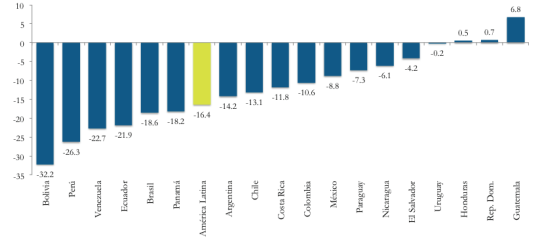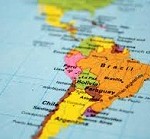More than 56 million people have been lifted out of poverty in Latin America in the period 2000-2012, according to a UNDP report released on 26 August. The report was based on data from 18 countries (barring Cuba and Haiti) in the region accounting for 90% of the total population.
According to the study, the poverty level (under $4 a day) fell from 42% to 25%, and the number of poor reduced to 134 million in 2012.
The population of the middle class (earnings of $10-$50 per day) rose from 21 % to 34% to reach 181 million. Between the middle class and the poor there were 200 million who earned between $4-$10 a day.
Latin America: Poverty reduction table

Sources: United Nations Development Programme (UNDP) Latin America report
The credit for poverty reduction should be given primarily to the pro-poor policies of the left-of-centre governments in the region – the top five countries with the highest poverty reduction have leftist governments.
Take Bolivia and Guatemala – the former which has reported the highest poverty reduction is run by a leftist government, while Guatemala’s poverty levels have increased under a rightist government.
Evo Morales, Bolivia’s first Indian President, is the architect of Bolivian success. Indians, who form 60% of the population and the bulk of the poor, were relegated to the sidelines by the conservative European descendant rulers. It was Morales who made this economically challenged group a priority. But the Guatemalan Indians who constitute 60% of the population continue to be marginalised by the conservative governments of European descent. When leftist President, Jacobo Arbenz, tried to implement some progressive policies he was branded a communist, overthrown in a coup engineered by United Fruit company and the CIA, and a right-wing dictatorship was installed.
The current, democratically-elected, president is Otto Perez Molina, a retired Army general – not so surprising then that Guatemala has the highest proportion (63.1%) of economically challenged people in the whole region.
Uruguay has the highest proportion of middle class (60.2%), but its population is just 3.4 million. In the top four biggest markets, the middle class constitute 34.8% in Brazil, 26.4% in Mexico, 54.4% in Argentina and 26.8% in Colombia.
The success of poverty alleviation is the reason why leftists have been elected and re-elected in many countries of the region. At present, 10 Latin America countries – Chile, Brazil, Bolivia, Uruguay, Peru, Ecuador, Venezuela, Nicaragua, El Salvador and Cuba (unelected) – have leftist governments.
The conservatives were defeated in the last elections in Chile and Mexico. In Chile, the conservatives, came to power in 2010 after two decades of centre-left governments, lost to the Left in the December 2013 elections. In Mexico, the left-of-centre Institutional Revolutionary Party (PRI) defeated the conservative National Action Party (PAN) party which was in power for two terms until 2012.
At present only four countries have conservative governments – Colombia, Honduras, Paraguay and Guatemala. In Colombia, the Left has been given a bad name by the FARC guerrillas who have misappropriated Marxist-Leninist ideology and got into drug trafficking, kidnappings and terrorism. In Honduras and Paraguay, the conservatives came to power through questionable routes. In Honduras, leftist President Manuel Zelaya was overthrown in a coup in 2009 with indirect U.S. support. The powers that orchestrated the coup ensured a conservative victory in the 2010 and 2013 elections.
In Paraguay, there was a congressional coup by the conservatives in 2012 who forced leftist President Fernando Lugo out of office. The oligarchs of the country conspired together and have re-established centre-right governments since then.
Given the link between poverty alleviation and politics, it is no surprise that the Left is expected to retain power in the elections to be held in Brazil, Bolivia and Uruguay in October this year.
The emancipation of people from poverty and the enlargement of middle class in Latin America is encouraging news for Indian companies which export medicines, two and three wheelers, cell phones, clothes, and other goods affordable for the low income groups.
Ambassador Viswanathan is Distinguished Fellow, Latin America Studies, Gateway House. He is the former Indian Ambassador to Argentina, Uruguay, Paraguay and Venezuela, and Consul General in Sao Paulo.
This blog was exclusively written for Gateway House: Indian Council on Global Relations. You can read more exclusive content here.
For interview requests with the author, or for permission to republish, please contact outreach@gatewayhouse.in.
© Copyright 2014 Gateway House: Indian Council on Global Relations. All rights reserved. Any unauthorized copying or reproduction is strictly prohibited


